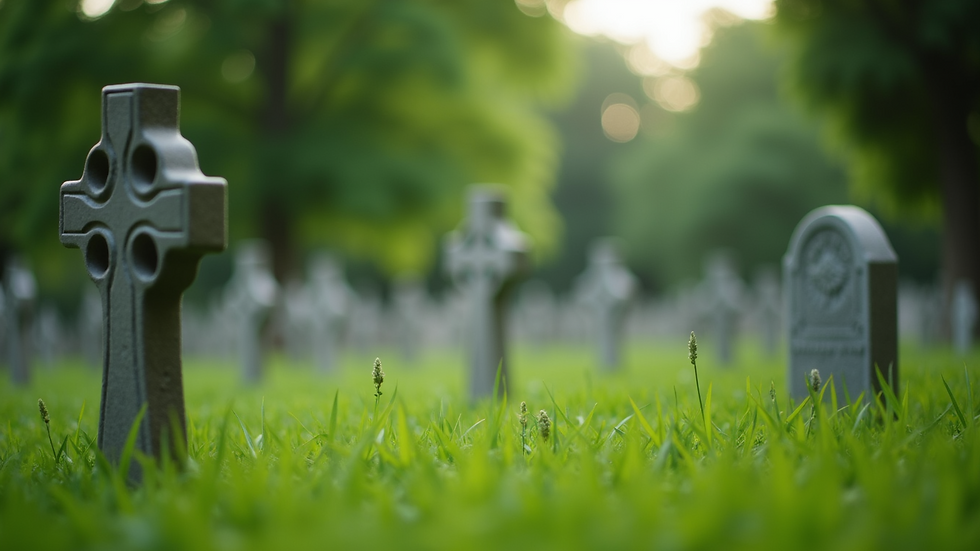The Environmental Impact of Traditional Funerals
- max02534
- Oct 6, 2025
- 3 min read
When we think about honoring those we love, we often focus on memories, stories, and traditions. Yet, there is another layer to consider - the funeral environmental impact. Traditional funerals, while deeply meaningful, can leave a significant footprint on our planet. Today, I want to gently explore this topic with you, sharing insights and hopeful alternatives that can help us care for both our loved ones and the Earth.
The Funeral Environmental Impact: What Does It Mean?
Funerals are a time of reflection and respect, but they also involve processes that affect the environment. From the materials used in caskets to the energy consumed during embalming and burial, each step has consequences. For example, traditional caskets are often made from hardwoods or metals, which require energy-intensive manufacturing and do not decompose easily. Cemeteries themselves take up large areas of land, sometimes disrupting natural habitats.
Understanding the funeral environmental impact means recognizing these effects and considering how we might reduce them. It’s about finding balance - honoring life while nurturing the world that sustains us.

How Traditional Funerals Affect Our Planet
Traditional funerals involve several practices that contribute to environmental strain:
Embalming: This process uses chemicals like formaldehyde to preserve the body, which can be harmful to soil and water.
Casket production: Many caskets are made from non-renewable resources and treated with toxic finishes.
Cemetery land use: Large plots of land are dedicated to burial, often maintained with water-intensive landscaping and pesticides.
Transportation: Hearses and family vehicles contribute to carbon emissions during funeral processions.
Each of these elements adds up, creating a cumulative environmental impact. But there is hope. By understanding these factors, we can make choices that honor our loved ones and protect the Earth.

Is Embalming Fluid Toxic to the Environment?
One of the most concerning aspects of traditional funerals is embalming. Embalming fluid typically contains formaldehyde, a chemical that preserves the body but is toxic to the environment. When a body is buried, these chemicals can leach into the soil and groundwater, potentially harming plants, animals, and even human health.
The good news is that embalming is not always necessary. Many families choose to forgo embalming, especially if the body will be buried quickly or cremated. Green burial options often avoid embalming altogether, using natural methods to allow the body to return to the earth gently and safely.
By choosing alternatives to embalming, we reduce the release of harmful chemicals and support a healthier planet.

Practical Steps Toward Eco-Friendly Funerals
If you are considering how to reduce the environmental impact of funerals, here are some practical steps to guide you:
Choose biodegradable caskets or shrouds: Materials like bamboo, wicker, or untreated wood break down naturally.
Opt for green burial sites: These cemeteries focus on preserving natural landscapes and avoid chemical treatments.
Skip embalming when possible: Discuss with funeral providers about alternatives that do not require toxic chemicals.
Limit transportation emissions: Consider local services and reduce the number of vehicles involved.
Support sustainable funeral homes: Seek providers committed to eco-friendly practices.
These choices may feel small, but they add up to a meaningful difference. Together, we can honor our loved ones while healing the planet.
Embracing a New Tradition: Hope for the Future
The journey toward more sustainable funerals is a path of hope and healing. By embracing eco-friendly options, we create new traditions that respect both life and the environment. This gentle shift allows us to celebrate memories without compromising the Earth’s future.
If you want to learn more about how to reduce the environmental impact of funerals, there are resources and communities ready to support you. Together, we can make green burial accessible and meaningful for all families.
Choosing sustainability in end-of-life care is a gift - a way to honor those we love and nurture the world we share.
Thank you for joining me in this reflection. May we all find peace in honoring life with kindness to the Earth.




Comments